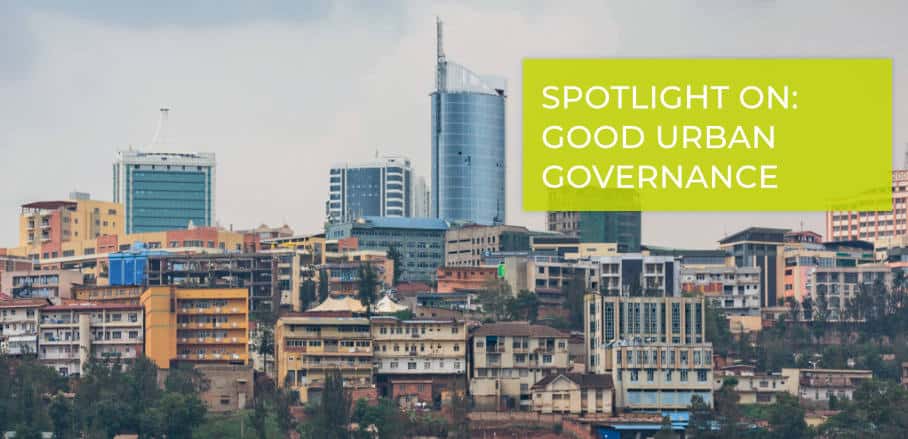Infrastructure Transparency in Metropolitan Kampala
Efforts for infrastructure development will be in vain if the public is not involved in the process. Olive Kabatwairwe with meaningful insights and best practices from Uganda
Kampala Capital is the largest city in Uganda and is managed as an Authority established in 2010 by an Act of Parliament. In the prospects of development, the city has been extended to cover what is now known as Kampala’s metropolitan area. The Greater Kampala Metropolitan Area (GKMA) has experienced significant urban growth for many decades and is currently the second-fastest growing urban area in East Africa. Infrastructure development is high on the agenda: Gaps in urban settlements coupled with floods, which have most often ravaged construction works and blocked drainage systems, have also worsened traffic flows and damaged public transport. Thus, various studies have been undertaken leading to the development of a master plan for various infrastructure aspects, such as roads, housing, energy, and sanitation among others.
But despite efforts to improve infrastructure development, there is a lack of transparency and accountability in the preparation, planning, procurement, and implementation of infrastructure projects. A 2019 Citizen Survey carried out by CoST Uganda revealed that the public continues to decry the lack of involvement in public infrastructure planning and implementation. Lack of effective stakeholder involvement often leads to mismanagement, site abandonment, poorly constructed infrastructure, time and cost overruns and theft of materials – which often subjects citizens to the effects of poorly constructed infrastructure.
The Four Core Features to Further Infrastructure Transparency
CoST Uganda, a national chapter of CoST International, improves infrastructure delivery within Kampala City and the greater Kampala metropolis through the implementation of the CoST features of Disclosure, Assurance, Multi-Stakeholder working and Social Accountability. Since 2016, CoST Uganda has worked with Kampala Capital City Authority (KCCA) and Wakiso District Local Government, promoting infrastructure transparency, through citizen engagement and strengthening access to information.
CoST’s work in Kampala has especially been built on the Assurance and Social Accountability features. Social accountability recognises the crucial role that the public, media, and civil society play in holding decision-makers to account. Facilitating discussions about infrastructure is a key means by which the public becomes engaged in the process, ensuring issues such as project commencement, cost and quality remain in the public sphere. In Kampala metropolis, CoST Uganda has deployed both traditional engagement approaches by using public events called ‘barazas’, and direct physical engagements with public officials. We found this to be highly effective in building citizen engagement and trust in the region.

A Baraza held in Rukiga district, Southwest Uganda during the Covid pandemic, on an irrigation project © CoST Uganda
Building Trust and Accountability Through Barazas
In 2017, CoST Uganda held a community Baraza in Wakiso, a district within the greater Kampala metropolitan. The district projects were associated with limited citizens’ engagement, lack of information, accidents with at least two fatalities along the Namasuba Ndejje Kitiko road, delays in project delivery, flooding which often washed away people’s homes. Construction works were often associated with quality issues, dust, and lack of safety safeguards. Citizens often raised concerns through unofficial ways with few results.
The Baraza held in 2017 was a turning point for citizens. They were able to raise concerns and saw the district take action. Following the Baraza, speed bumps were erected in February 2018. The Namasuba Ndejje Kitiko road works through the swamp were fast-tracked and culverts were built which manage the flooding. This is now a paved road with drainage on either side, passable even in the rainy season. Since the speed bumps were erected, there have been zero fatalities on this stretch of the road. Local businesses are no longer losing customers due to accessibility issues, and the installation of culverts means the road no longer floods.
The first Baraza provided useful lessons that were replicated in other barazas organised by CoST and other local authorities elsewhere. Of note is their success in involving previously disadvantaged groups: women represented 40 per cent of total participants in the first Baraza which increased to nearly 50 per cent in a second Baraza organised in the following year.

© CoST
Lessons Learnt
Overall, by engaging with the urban communities, the relationship between citizens, Wakiso and KCCA has transformed. KCCA improved its information-sharing framework physically and virtually, whereas Wakiso enhanced access to citizens through geo-mapping. There has also been an improved performance of infrastructure projects.
Makindye Sabagabo Municipal council worked with the communities to address the health and safety concerns within the municipality: “CoST has had a really positive impact on community engagement in this issue. In terms of planning projects, we now know to communicate and involve communities as much as possible. Because we’ve done this, people have been happy to give parts of their land to widen roads for garbage trucks”, concludes Joseph Kimbowa, the then Town Clerk of Makindye Sabagabo Municipality.
These stories from Uganda demonstrate the impact of the CoST approach. By using Barazas as a platform for information sharing, residents have had opportunities to raise pressing concerns about truly life-changing issues. Whilst we are seeing increased buy-in of the barazas among officials at the district level, funding the events has been limited, meaning that events can only be held once or twice yearly.
The CoST Uganda 2021 updated scoping study, which will be released September 2021, has revealed that stakeholders continue asking CoST to further its citizen engagement approach across Uganda, noting that citizen empowerment in the sector is needed now more than ever. We hope that funding to local authorities for these events will increase so they can begin to self-fund the Barazas in the future, without or with limited support from CoST Uganda. If we continue to see better quality infrastructure as a result of such events, the case for further support is a strong one.
- Infrastructure Transparency in Metropolitan Kampala - 9. September 2021
